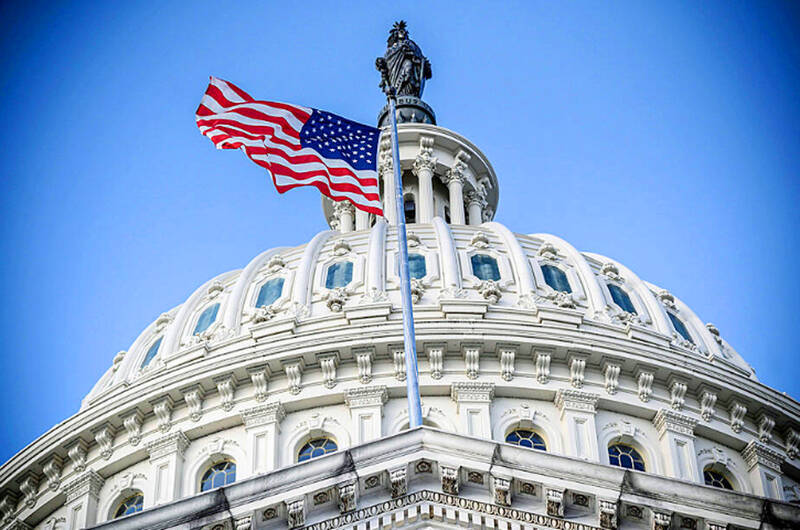The US House of Representatives yesterday passed the US-Taiwan Expedited Double-Tax Relief Act by a 423 to 1 vote.
The bill is to be first sent to the US Senate to vote on before being sent to the US president for his signature to be passed into legislation.
The act would first exempt taxation for qualified Taiwanese residents who provide services in the US, and offer a lower withholding tax rate for qualified Taiwanese residents with particular types of US-sourced income such as dividends or interest.

Photo: AFP
Second, the United States-Taiwan Tax Agreement Authorization Act would improve tax cooperation between the two countries, granting the US president authority to negotiate and establish a tax agreement with Taiwan.
Taiwan has been pushing for a double taxation agreement in recent years to benefit businesses on both sides of the Pacific.
It failed to pass in the previous session.
The act “paves the way for increased Taiwanese investment in the US economy,” the New Democrat Coalition of the House said in a joint statement.
As the US and Taiwan have no formal diplomatic relations, for decades there have been no tax agreement, forcing individuals to pay taxes to both governments if they live or work in both nations and giving Taiwanese businesses “an excessively high withholding tax when compared to other close trading partners,” the coalition said.
The bill aims to “lower costs on cross-border investment, help expand domestic production of key technologies including chips and create high-paying jobs in communities across the [US],” it said.
As Taiwan is one of the US’ largest trade partners, the act would “unleash American manufacturing jobs, support [US] semiconductor and chip manufacturing capabilities and secure strategic supply chains, while reducing [US] dependence on China,” House Committee on Ways and Means Chairman Jason Smith wrote on X.
Without the agreement, US employees sent to Taiwan for training at semiconductor factories would have to pay double taxes on their income, US House Representative Judy Chu (趙美心) said.
The US has already signed double taxation agreements with more than 60 countries, but due to Taiwan’s unique political position it cannot partake in traditional tax agreements, making Taiwan the only one of the US’ top 10 trade partners without such an agreement, she added.
Chu said that Taiwanese businesses have told her that in the face of large tax bills, they have reduced investment in the US.
A survey conducted by the American Institute in Taiwan found that 79 percent of respondents agreed that double taxation was a deterrent to US investments, she added.
In light of the House passing the bill, President William Lai (賴清德) said he hoped that Legislative Speaker Han Kuo-yu (韓國瑜), who is leading a delegation to attend the US presidential inauguration next week, could mark this new milestone in Taiwan-US relations in Washington.

FREEDOM OF NAVIGATION: The UK would continue to reinforce ties with Taiwan ‘in a wide range of areas’ as a part of a ‘strong unofficial relationship,’ a paper said The UK plans to conduct more freedom of navigation operations in the Taiwan Strait and the South China Sea, British Secretary of State for Foreign, Commonwealth and Development Affairs David Lammy told the British House of Commons on Tuesday. British Member of Parliament Desmond Swayne said that the Royal Navy’s HMS Spey had passed through the Taiwan Strait “in pursuit of vital international freedom of navigation in the South China Sea.” Swayne asked Lammy whether he agreed that it was “proper and lawful” to do so, and if the UK would continue to carry out similar operations. Lammy replied “yes” to both questions. The

‘OF COURSE A COUNTRY’: The president outlined that Taiwan has all the necessary features of a nation, including citizens, land, government and sovereignty President William Lai (賴清德) discussed the meaning of “nation” during a speech in New Taipei City last night, emphasizing that Taiwan is a country as he condemned China’s misinterpretation of UN Resolution 2758. The speech was the first in a series of 10 that Lai is scheduled to give across Taiwan. It is the responsibility of Taiwanese citizens to stand united to defend their national sovereignty, democracy, liberty, way of life and the future of the next generation, Lai said. This is the most important legacy the people of this era could pass on to future generations, he said. Lai went on to discuss

SECOND SPEECH: All political parties should work together to defend democracy, protect Taiwan and resist the CCP, despite their differences, the president said President William Lai (賴清德) yesterday discussed how pro-Taiwan and pro-Republic of China (ROC) groups can agree to maintain solidarity on the issue of protecting Taiwan and resisting the Chinese Communist Party (CCP). The talk, delivered last night at Taoyuan’s Hakka Youth Association, was the second in a series of 10 that Lai is scheduled to give across Taiwan. Citing Taiwanese democracy pioneer Chiang Wei-shui’s (蔣渭水) slogan that solidarity brings strength, Lai said it was a call for political parties to find consensus amid disagreements on behalf of bettering the nation. All political parties should work together to defend democracy, protect Taiwan and resist

By refusing to agree spending increases to appease US President Donald Trump, Spanish Prime Minister Pedro Sanchez threatened to derail a summit that NATO Secretary-General Mark Rutte needs to run smoothly for the sake of the military alliance’s future survival. Ahead of yesterday’s gathering in The Hague, Netherlands, things were going off the rails. European officials have expressed irritation at the spoiler role that Sanchez is playing when their No. 1 task is to line up behind a pledge to raise defense spending to 5 percent of GDP. Rutte needed to keep Spain in line while preventing others such as Slovakia